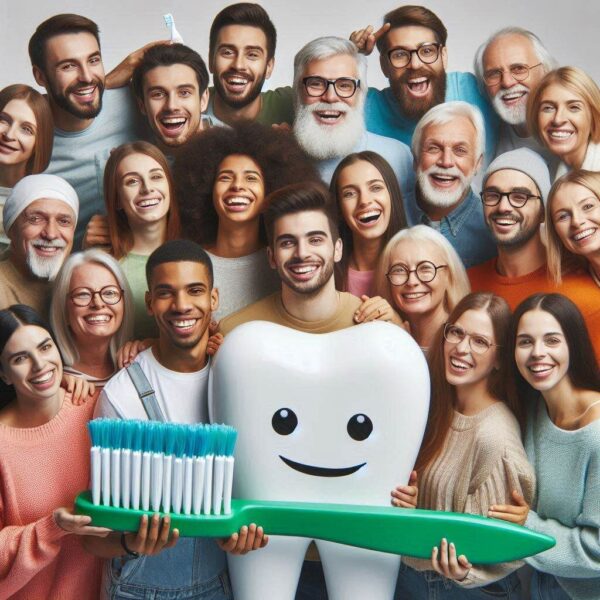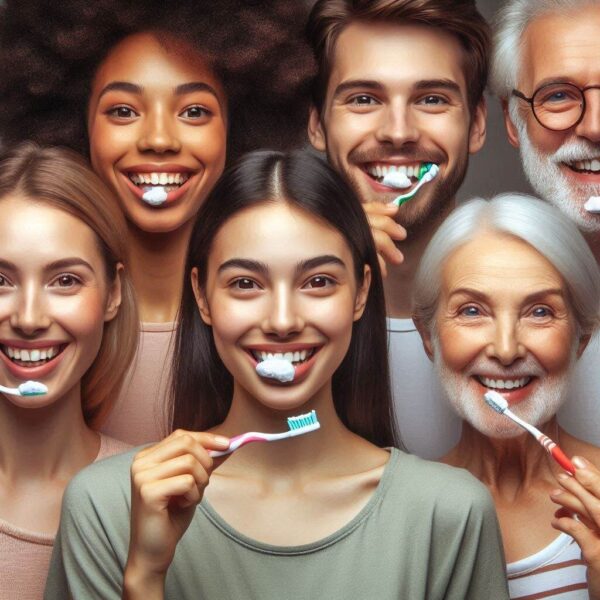
World Oral Health Day, celebrated annually on March 20th, is a global initiative aimed at raising awareness about the importance of oral health and promoting good oral hygiene practices.
Organized by the FDI World Dental Federation, this day brings together individuals, communities, and organizations worldwide to advocate for better oral health policies and educate the public about the impact of oral diseases on overall health.
By encouraging preventive care and regular dental check-ups, World Oral Health Day strives to reduce the burden of oral diseases, improve quality of life, and ensure that people of all ages can enjoy healthier, happier smiles.
World Oral Health Day

World Oral Health Day, celebrated every year on March 20th, is a significant global event aimed at raising awareness about the importance of oral health and promoting good oral hygiene practices.
This initiative, organized by the FDI World Dental Federation, seeks to bring together individuals, communities, and organizations worldwide to advocate for better oral health policies and educate the public about the impact of oral diseases on overall health.
Importance of Oral Health
Overall Health Connection
Oral health is an integral part of overall health and well-being. Poor oral health can lead to a range of issues, including gum disease, tooth decay, and bad breath.
More critically, it is linked to serious conditions such as heart disease, diabetes, respiratory infections, and adverse pregnancy outcomes.
Quality of Life
Maintaining good oral health is essential for overall quality of life. It affects how we eat, speak, and interact socially. Healthy teeth and gums contribute to self-esteem and confidence, enabling people to live more comfortably and confidently.
Objectives of World Oral Health Day
Raising Awareness
World Oral Health Day aims to increase global awareness of oral health issues. By highlighting the significance of oral hygiene, it encourages individuals to adopt better oral care habits and make informed decisions about their oral health.
Promoting Preventive Care
One of the key messages of World Oral Health Day is the importance of preventive care. Regular dental check-ups, proper brushing and flossing, and a healthy diet are crucial in preventing oral diseases and maintaining optimal oral health.
Advocating for Policy Change
World Oral Health Day also serves as a platform for advocating for improved oral health policies at national and international levels. It calls for better access to dental care, especially in underserved communities, and promotes the integration of oral health into overall health policies.
How to Participate
Education and Awareness Campaigns
Various educational campaigns and activities are organized globally to mark World Oral Health Day. Schools, dental clinics, and community organizations hold workshops, seminars, and free dental check-ups to spread awareness about the importance of oral hygiene.
Social Media Engagement
Social media plays a significant role in amplifying the messages of World Oral Health Day. People are encouraged to share their oral health tips, success stories, and the importance of maintaining good oral hygiene using hashtags and participating in online discussions.
Personal Commitment
Individuals can participate by committing to better oral hygiene practices. This includes brushing twice a day with fluoride toothpaste, flossing daily, reducing sugar intake, and visiting the dentist regularly. I hope now you understand about World Oral Health Day.
Who invented World Oral Health Day?

World Oral Health Day was established by the FDI World Dental Federation. The FDI, founded in 1900, is a global organization representing dentists and dental professionals worldwide.
The initiative of World Oral Health Day was created to raise awareness about the importance of oral health and the impact of oral diseases on overall health.
The day is celebrated annually on March 20th and aims to promote good oral hygiene practices, and preventive care, and advocate for better oral health policies globally.
What Is The Concept Of Oral Health?
The Concept of Oral Health
Oral health encompasses the well-being of the entire mouth, including the teeth, gums, tongue, and associated structures. It is not merely the absence of disease but a state of overall well-being where an individual can perform essential functions like chewing, speaking, and smiling comfortably and confidently.
Key Components of Oral Health
Healthy Teeth and Gums
Healthy teeth are free from cavities and decay, while healthy gums are firm, pink, and do not bleed easily. Good oral health ensures that teeth and gums are strong and function effectively.
Proper Oral Hygiene Practices
Maintaining oral health requires regular and effective oral hygiene practices, including brushing twice daily with fluoride toothpaste, flossing daily, and using mouthwash. These habits help prevent plaque buildup, tooth decay, and gum disease.
Balanced Diet and Nutrition
A balanced diet rich in essential nutrients, vitamins, and minerals plays a critical role in maintaining oral health. Foods high in sugar and acid can erode tooth enamel and contribute to cavities, so it is crucial to limit their intake.
Regular Dental Check-Ups
Routine visits to the dentist are essential for maintaining oral health. Professional cleanings, examinations, and early detection of potential issues help prevent serious dental problems and ensure that any issues are addressed promptly.
Avoidance of Harmful Habits
Avoiding harmful habits such as smoking, excessive alcohol consumption, and using teeth as tools (e.g., opening packages) is vital for maintaining good oral health. These habits can lead to gum disease, oral cancer, and other oral health issues.
Importance of Oral Health
Overall Health Connection
Oral health is closely linked to overall health. Poor oral health can contribute to systemic conditions such as heart disease, diabetes, respiratory infections, and complications during pregnancy. Maintaining good oral health helps reduce the risk of these conditions.
Quality of Life
Good oral health enhances quality of life by allowing individuals to eat, speak, and socialize without discomfort or embarrassment. It boosts self-esteem and confidence, contributing to overall well-being and happiness.
Preventive Care
Emphasizing preventive care in oral health reduces the incidence of dental problems and associated healthcare costs. Preventive measures include regular dental visits, proper oral hygiene, and a healthy diet.
Why Oral Health Is So Important

Oral health is a critical aspect of overall health and well-being. It encompasses the health of the teeth, gums, and entire oral-facial system that allows us to smile, speak, and chew.
Maintaining good oral health is essential for several reasons, which extend beyond merely having a bright smile.
Connection to Overall Health
Systemic Health
Oral health is directly linked to systemic health. Poor oral hygiene can lead to oral infections, which may contribute to more serious health conditions such as cardiovascular disease, diabetes, respiratory infections, and complications during pregnancy.
For instance, bacteria from the mouth can enter the bloodstream and cause inflammation in other parts of the body.
Disease Prevention
Maintaining good oral health can help prevent a variety of diseases. Regular brushing and flossing remove plaque, a sticky film of bacteria that can lead to tooth decay and gum disease.
By preventing plaque buildup, you can reduce the risk of cavities and periodontal diseases, which are major causes of tooth loss.
Quality of Life
Functional Well-being
Good oral health ensures that you can perform essential functions comfortably, such as eating, speaking, and smiling. Dental problems can interfere with these basic activities, leading to pain, embarrassment, and difficulty in everyday tasks.
Mental and Social Well-being
A healthy mouth contributes to self-esteem and confidence. People with good oral health are more likely to smile and interact socially without fear of bad breath or unsightly teeth. This positive self-image is important for mental and social well-being.
Economic Impact
Reduced Healthcare Costs
Preventive dental care is cost-effective. Regular dental check-ups and cleanings can prevent the need for more expensive treatments like fillings, crowns, and surgeries. By investing in oral health, individuals can save on future healthcare costs associated with untreated dental issues.
Work and School Productivity
Oral health problems can lead to missed work or school days due to pain or necessary dental treatments. Maintaining good oral hygiene helps minimize these disruptions, ensuring that individuals remain productive and engaged in their daily activities.
Conclusion
World Oral Health Day serves as a vital reminder of the importance of maintaining good oral health and its connection to overall well-being.
Celebrated on March 20th each year, this global initiative by the FDI World Dental Federation encourages individuals, communities, and organizations to engage in activities and practices that promote oral hygiene.
By raising awareness, promoting preventive care, and advocating for better oral health policies, World Oral Health Day aims to reduce the prevalence of oral diseases and improve quality of life worldwide. Everyone has a role to play in ensuring a future where oral health is a priority and healthy smiles are a reality for all. I hope now you are fully aware of what is World Oral Health Day.
FAQs
Q1. When is World Oral Health Day celebrated?
A1. World Oral Health Day is celebrated annually on March 20th.
Q2. Who organizes World Oral Health Day?
A2. World Oral Health Day is organized by the FDI World Dental Federation.
Q3. Why is oral health important?
A3. Oral health is crucial for overall health and well-being. Poor oral health can lead to serious conditions such as heart disease, diabetes, and respiratory infections, and it affects quality of life by impacting functions like eating, speaking, and social interactions.
Q4. How can I participate in World Oral Health Day?
A4. You can participate by joining educational campaigns, engaging in social media activities, promoting good oral hygiene practices, and supporting policies that improve access to dental care.
Q5. What are some good oral hygiene practices?
A5. Good oral hygiene practices include brushing your teeth twice a day with fluoride toothpaste, flossing daily, reducing sugar intake, eating a balanced diet, and visiting the dentist regularly for check-ups and cleanings.
